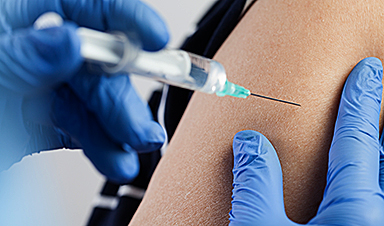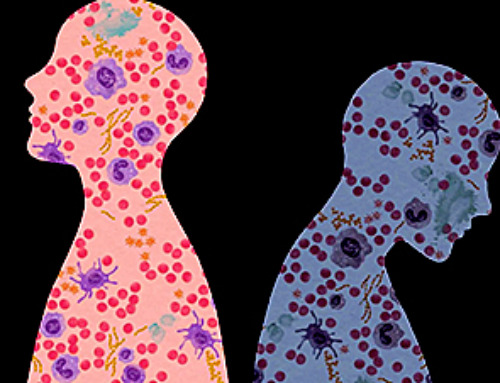According to the Robert Koch Institute (RKI), the norovirus, which is widespread worldwide, is the cause of a large proportion of gastrointestinal infections. Those who catch the virus suffer from nausea, diarrhea and vomiting. It is very contagious and can spread quickly from person to person.
There is not much that can be done preventively beyond general hygiene rules. There is currently no vaccine against the norovirus. However, doctors have now begun to test the world’s first mRNA vaccine against the norovirus.
Norovirus vaccine based on mRNA technology is being tested
The vaccine is to undergo a phase three clinical trial called Nova 301. In two years, 25,000 people, mainly over 60 years old, from countries such as Japan, Canada and Australia are to be involved, reports the Guardian. Mobile teams are also to be used to make it easier for people to participate in the trial.
Half of the participants are to receive the new mRNA vaccine and the other half a saline solution as a placebo. The assignment follows at random.
Various institutions of the British National Health Service (NHS) and the pharmaceutical company Moderna, which manufactures the vaccine, are involved in the study. The norovirus vaccine is based on an mRNA technology with which the company Moderna, but also Pizer/Biontech, have already produced a vaccine against the corona virus.
In an earlier trial with the new norovirus vaccine, strong immune reactions are said to have already been detected in humans. The study is now about investigating whether the vaccine is effective against the virus itself and, if so, how long the protection lasts. “At least 65 percent (efficacy) or more is what we would consider clinically sensible,” the Guardian quotes Dr. Doran Fink of Moderna.
Norovirus is a threat to old and sick people
Norovirus outbreaks are common in hospitals, nursing homes, daycare centers or schools. Especially for very young or old people and for anyone who has a weakened immune system, an infection can have serious consequences. A successful vaccine would help ensure that operations in nursing homes could be maintained normally, says Prof. Saul Faust of the University of Southampton, according to the report.
General practitioner and study leader Dr. Patrick Moore emphasizes how high the burden of norovirus is. Worldwide, there are about 685 million cases and 200,000 deaths every year. In the UK, there are about four million cases a year.
It is hoped that a vaccine could bring health and economic benefits. “In the UK, norovirus costs the NHS an estimated £100 million a year [and] if you take into account the loss of earnings, it’s about £300 million,” says Moore.
If the result of the study is positive, it is expected that it will be possible to submit an application for approval for the vaccine in 2026. However, the review process would take another up to a year. In addition, further studies on teenagers and younger people would be needed.
News
This Simple Brain Exercise May Protect Against Dementia for 20 Years
A long-running study following thousands of older adults suggests that a relatively brief period of targeted brain training may have effects that last decades. Starting in the late 1990s, close to 3,000 older adults [...]
Scientists Crack a 50-Year Tissue Mystery With Major Cancer Implications
Researchers have resolved a 50-year-old scientific mystery by identifying the molecular mechanism that allows tissues to regenerate after severe damage. The discovery could help guide future treatments aimed at reducing the risk of cancer [...]
This New Blood Test Can Detect Cancer Before Tumors Appear
A new CRISPR-powered light sensor can detect the faintest whispers of cancer in a single drop of blood. Scientists have created an advanced light-based sensor capable of identifying extremely small amounts of cancer biomarkers [...]
Blindness Breakthrough? This Snail Regrows Eyes in 30 Days
A snail that regrows its eyes may hold the genetic clues to restoring human sight. Human eyes are intricate organs that cannot regrow once damaged. Surprisingly, they share key structural features with the eyes [...]
This Is Why the Same Virus Hits People So Differently
Scientists have mapped how genetics and life experiences leave lasting epigenetic marks on immune cells. The discovery helps explain why people respond so differently to the same infections and could lead to more personalized [...]
Rejuvenating neurons restores learning and memory in mice
EPFL scientists report that briefly switching on three “reprogramming” genes in a small set of memory-trace neurons restored memory in aged mice and in mouse models of Alzheimer’s disease to level of healthy young [...]
New book from Nanoappsmedical Inc. – Global Health Care Equivalency
A new book by Frank Boehm, NanoappsMedical Inc. Founder. This groundbreaking volume explores the vision of a Global Health Care Equivalency (GHCE) system powered by artificial intelligence and quantum computing technologies, operating on secure [...]
New Molecule Blocks Deadliest Brain Cancer at Its Genetic Root
Researchers have identified a molecule that disrupts a critical gene in glioblastoma. Scientists at the UVA Comprehensive Cancer Center say they have found a small molecule that can shut down a gene tied to glioblastoma, a [...]
Scientists Finally Solve a 30-Year-Old Cancer Mystery Hidden in Rye Pollen
Nearly 30 years after rye pollen molecules were shown to slow tumor growth in animals, scientists have finally determined their exact three-dimensional structures. Nearly 30 years ago, researchers noticed something surprising in rye pollen: [...]
NanoMedical Brain/Cloud Interface – Explorations and Implications. A new book from Frank Boehm
New book from Frank Boehm, NanoappsMedical Inc Founder: This book explores the future hypothetical possibility that the cerebral cortex of the human brain might be seamlessly, safely, and securely connected with the Cloud via [...]
How lipid nanoparticles carrying vaccines release their cargo
A study from FAU has shown that lipid nanoparticles restructure their membrane significantly after being absorbed into a cell and ending up in an acidic environment. Vaccines and other medicines are often packed in [...]
New book from NanoappsMedical Inc – Molecular Manufacturing: The Future of Nanomedicine
This book explores the revolutionary potential of atomically precise manufacturing technologies to transform global healthcare, as well as practically every other sector across society. This forward-thinking volume examines how envisaged Factory@Home systems might enable the cost-effective [...]
A Virus Designed in the Lab Could Help Defeat Antibiotic Resistance
Scientists can now design bacteria-killing viruses from DNA, opening a faster path to fighting superbugs. Bacteriophages have been used as treatments for bacterial infections for more than a century. Interest in these viruses is rising [...]
Sleep Deprivation Triggers a Strange Brain Cleanup
When you don’t sleep enough, your brain may clean itself at the exact moment you need it to think. Most people recognize the sensation. After a night of inadequate sleep, staying focused becomes harder [...]
Lab-grown corticospinal neurons offer new models for ALS and spinal injuries
Researchers have developed a way to grow a highly specialized subset of brain nerve cells that are involved in motor neuron disease and damaged in spinal injuries. Their study, published today in eLife as the final [...]
Urgent warning over deadly ‘brain swelling’ virus amid fears it could spread globally
Airports across Asia have been put on high alert after India confirmed two cases of the deadly Nipah virus in the state of West Bengal over the past month. Thailand, Nepal and Vietnam are among the [...]





















